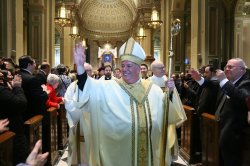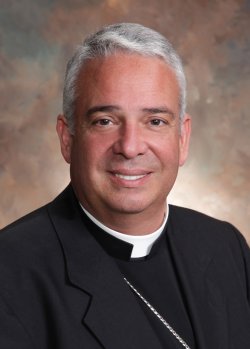‘You Are a Gift’
Archbishop of Philadelphia Nelson J. Pérez ’84 calls on young people to serve the world
Posted in: Humanities and Social Sciences, University

Just a few weeks after Nelson J. Pérez ’84 was installed as the 10th archbishop (and 14th bishop) of the Archdiocese of Philadelphia, overseeing the spiritual life of 1.3 million Roman Catholics, the global COVID-19 pandemic sent his flock into lockdown.
“I stand and I preach to an empty cathedral that holds 1,200 people. There’s no one there and at the same time, there are a lot of people there,” Pérez explains. “In the last few months my presence has been virtual, which has been odd.”
However, the self-proclaimed extrovert says there has been a silver lining: Some 27,000 to 30,000 people were watching the livestream of Sunday Mass from the Cathedral Basilica of Saints Peter and Paul in Philadelphia each week before the limited return of in-person Mass began in June.
The Basilica is a long way from the archbishop’s time earning a bachelor’s degree in Psychology at Montclair State, but Pérez remembers how those years shaped him: “My college years were not party hardy. They were study worky – which I think helped form a certain work ethic in me.”
Pérez is perhaps not what you would expect from someone who is soon to be a “Prince of the Church” – it is anticipated that Pope Francis will ultimately elevate him to cardinal. He is funny, easy to talk to and interested in interviewing the interviewer.
Pérez was beloved by his flock in Cleveland, where he recently served as bishop, and has earned the warm regard of Philadelphians, who remember his years as a parish priest in the archdiocese and as an educator at La Salle University. In his short time as archbishop, he has already impressed victims of sexual abuse with his compassionate approach to their plaints and has co-authored a letter with other Catholic bishops decrying the disproportionate impact of COVID-19 on the African-American community (Pérez serves as the chair of the Committee on Cultural Diversity for the U.S. Conference of Bishops).
The middle son of Cuban immigrants, Pérez grew up mostly in West New York, New Jersey. During his undergraduate years, he drove along Route 3 to what was then Montclair State College, scheduling his classes early three days a week so that he could work nearly full time at Sears Credit Central in Secaucus.
His time at Montclair State and public schools in New Jersey helped mold him in multiple ways.
“What it did give me is a broader vision of the secular world,” says Pérez. “Because my education and formation was not exclusively within the realm of Catholic schools and Catholic education. That in some ways challenged my faith and made it stronger too.”
After Montclair State, Perez spent time teaching high school in Puerto Rico – “discerning religious life” – before entering the seminary and later transferring to St. Charles Borromeo Seminary in Philadelphia where he earned a Master of Divinity and Master of Arts in Theology.

“Then the Archdiocese of Philadelphia actually recruited me. They didn’t have a lot of Spanish-speaking priests,” says Pérez.
Indeed, Pérez is one of only three Hispanic archbishops in the U.S. and the first Hispanic to lead the Archdiocese of Philadelphia. His bilingual skills have helped endear him to Pope Francis, a native of Argentina who was archbishop of Buenos Aires before his election to pontiff.
Although Pérez’s parents and his brothers (both of whom are also Montclair State alumni) eventually moved to the Miami area, he reports that many of his cousins stayed in northern New Jersey and that he was back to visit the campus about five years ago.
“It’s really changed!” he notes.
Meanwhile, Pérez has been occupied with shepherding five counties of Catholics through a public health crisis with major socioeconomic, racial and cultural impacts.
“This moment with COVID, we will get through it. We are not done yet. It has brought upon all of us an opportunity to reevaluate what are the things that are important? The things we didn’t appreciate? That we took for granted? All of sudden our routines are taken away. People are saying, ‘We can’t wait to go to work.’ Families have reconnected. I think people have also reconnected with their faith.”
Nonetheless, Pérez says, we all crave human connection and a return to normalcy. “People have asked me, ‘Do you think this is the way we are going to go to church?’ No. That’s like having dinner on Zoom. It’s not the way human beings are nailed together. We are physical people. And you hear it in families. Families are saying, ‘We want a hug. We want to hold hands.’”
He also shared a message for today’s students:
“You are a gift to the world. When Pope Francis speaks about young people he doesn’t call you the future. He calls you ‘the now of God,’” says Pérez.
“And your education, these years that you are spending at Montclair State University, is really important because it’s laying down the foundation by which you are going to serve the world around you. That ultimately what you do with the formation and education that you get at Montclair State is not just about you. It’s about the world that you are going to help to make a better place.”
“Never underestimate the gift that you are to the people around you.”
Pérez was interviewed before the advent of widespread protests spurred by the death of George Floyd while in police custody. Pérez co-signed a letter with other bishops condemning the killing, held a press conference, and released his own statement to Philadelphians, stating in part: “Racial hatred has no place in our world, including here in the United States, or in the hearts of people. Every life is a precious gift from God. Racism is a mortal sin and an attack on that gift. All of us share a responsibility to bring an end to this evil and to do so in a way that seeks justice and peace. The perpetual cycle of pain and anguish must end.”
Story by Staff Writer Mary Barr Mann
